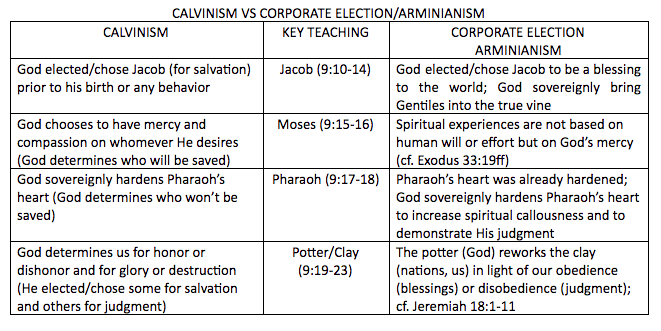
Sovereignly Chosen…for Renewing the World
Romans 9:1-33
Brief Comments
Introduction: Because of its emphasis on God’s sovereignty, chapter nine of Romans has been a center for theological discussion. Several questions such as “Is God’s sovereignty compatible with free will?” “Isn’t God less loving if God elected a limited number of people to be saved?” “Is it possible to interpret Romans 9 in a manner that highlights free will?” naturally arise from the text.
The Bible doesn’t contradict itself, but it does contain mysteries. Because God is infinite and we are finite it’s reasonable to believe in the mysteries revealed by God. Here are a few examples. The Bible is fully and completely inspired by God, but it’s also written by humans (personality, style, etc.). The person of Jesus is also a mystery. How can he be 100% divine and 100% human?
The doctrine of the Trinity (God is one in essence and three in Persons) is another example of a biblical mystery. In the same way, the teachings of God’s sovereignty and free will are not contradictory (they are compatible), but rather, they represent another mystery of God’s nature.
In general, there are three ways to interpret Romans 9 (Calvinism, Arminianism, corporate election). (1) Calvinists believe that God elected/chose individuals to be saved apart from their decision to follow Jesus. (2) Arminians believe that God elected/chose individuals to be saved because He foreknew their decision to follow Christ.
(3) Advocates of corporate election believe that God elected/chose a group of people in Christ (he is the ultimate one chosen/elected by God) (OT = Israel; NT = Church) to represent Him. (Note: Because corporate election can be a “theological nuanced position” within Arminianism, I will simply use the general term Arminianism when discussing Romans 9).
For those interested in digging deeper about Calvinism and Arminianism please continue reading. Others may look to our Romans 9:1-5 comments below.
Calvinists are supporters of John Calvin’s theology (1509-1564) and Arminians are advocates of Jacob Arminius’ theology (1560-1609). Although both theologians taught numerous doctrines, we will limit our discussion to Calvinism’s TULIP and the Five Articles of Remonstrance (developed by followers of Arminius).


It’s worth noting that some hold to five, four, or three points of Calvinism and likewise some believe in three, four, or five articles of the Remonstrance. Also, some combine different elements of Calvinism and Arminianism.
9:1-5: Romans 9 is primarily about God’s sovereignty (highlighted in His relationship with Israel). Romans 9 is answering the question, “Has God failed?” or “What is God doing with His people?” (since a majority of Israelites were not fulfilling their calling and destination as God’s chosen people).
To this question, Romans 9 answers, “God has sovereignly chosen/elected us to renew the world.” We are called to bless and serve others. We have a divine calling to change the world.
Paul begins chapter nine expressing his “great sorrow and unceasing anguish.” (1:2) He’s emotionally distraught because the majority his people, the Israelites, do not have a relationship with God.
Even though they have experienced spiritual adoption, God’s glory, the covenants, the law, worship, promises, patriarchs, and Christ himself was a Jew, they are presently outside of God’s blessings found in Christ and the Spirit (1:4-5). Paul is so broken over the spiritual condition of his people that he “could wish” himself “accursed and cut off from Christ” for his people (1:3).
9:6-9: It would be natural for the Jews to wonder if God’s Word (or God Himself!) has failed because many of them were not experiencing His spiritual blessings (1:6). Citing Genesis 21:12, Paul asserts that God’s Word has not failed (“Through Isaac shall your offspring be named”). So, how does Paul reach this conclusion?
Using a play on words, Paul makes a distinction between the physical and spiritual children of Abraham (“not all who are descended from Israel [physical] belong to Israel [spiritual].” (1:6) Likewise, “not all are children of Abraham [spiritual] because they are his offspring [physical].” (1:7)
Also, “it is not the children of the flesh [physical] who are children of God, but the children of the promise [spiritual] who “are counted as offspring [spiritual].” (1:8) Thus, it’s Isaac who symbolizes Abraham’s spiritual offspring and children of the promise (Galatians 3:16; 26-29) because he’s the fulfilment of Genesis 18:10 (cited in Romans 9:9: “About this time next year I will return, and Sarah shall have a son.”)
9:10-14: Beginning with these verses, the issue of election comes into play. As stated previously, there are three views concerning the nature of election (Calvinism, Arminianism, chosen election). I will note the Calvinist position, but interpret these verses along the lines of the Arminianism/chosen election view.
According to Calvinists, Jacob was chosen/elected “because of [God] who calls—according to His sovereign will and not based on foreknowledge). They point out that God’s election was unconditional because it occurred before birth and prior to any “good or bad” behavior.
On the other hand, it’s important to remember that the context for interpreting Romans 9. Israel was to be a light to the nations (Isaiah 42:6; 49:6; 60:3). As priests of the Lord (Isaiah 61:6), the Jews were called to mediate the presence of God through their love for Him and love for others. God’s calling of Israel is also His calling for us today.
In short, Romans 9 is about God’s sovereign call of Israel for service and not an individual call for salvation. While Paul highlights individuals throughout the passage he uses them to illustrate the nation of Israel and other nations.
For example, Romans 9:11-12 is referring to Genesis 25:23 where the two people are referring to two nations. In Romans 9:13, Paul is quoting Malachi 1:1-15 which makes reference to two individuals representing two nations (Jacob = Israel; Esau = Edom).
God’s calling/election of Jacob/nation of Israel prior to his birth or any behavior is not a reference to his unconditional election or individual call for salvation. “God’s purpose of [Jacob’s] election” (and Israel) was to be a blessing to the world.
God’s sovereign decision to choose Isaac and Jacob over Ishmael and Esau also provides a basis for His sovereign decision to choose the Gentiles to be grafted into the vine (spiritual Israel).
What about God loving Jacob and hating Esau? This phrase should be interpreted as a form of hyperbole and refers to God’s gracious favor bestowed upon Jacob—and not an example of God’s ill-will toward Esau (cf. Luke 14:26 where Jesus exhorts us to hate his family).
Was God unjust to choose Jacob (the nation of Israel) over Esau (Edomites)? “By no means!” answers Paul. The question here is for what did God choose/elect Jacob? Was it for salvation (Calvinists) or service (Arminians)? (Note: We have already made the case that the context of Romans 9 is the nation of Israel so the latter interpretation is the preferred one.)
9:15-18: Calvinists believe that God’s sovereign election is also demonstrated in Moses (9:15, 18; cf. Exodus 33:19) and his sovereign decision to not elect Pharaoh (9:17-18; cf. Exodus 9:16). In short, God has sovereignly shown “mercy on whomever he wills, and he hardens whomever he wills.”
Romans 9:15 is a reference to Exodus 33:19. It’s not referring to Moses’ salvation but rather, it’s about God revealing Himself/His glory to Moses. Paul is not teaching unconditional election. He’s teaching that spiritual experiences are not based “on human will or exertion, but on God’s sovereign mercy.”
Concerning the Pharaoh, we should note a few things. First, Pharaoh’s heart was already hardened due to his wickedness (cf. Romans 1:24-32). Second, Pharaoh also contributed to the hardening of his own heart (Exodus 8:15, 8:32). Third, God used Moses as an instrument of judgment and liberation (9:17).
God’s hardening of Pharaoh’s heart (Exodus 7:3-4; cf. 9:12; 10:1; 11:10; 14:4, 8) was not His sovereign choice to override or compel him against his will. God simply gives us over to our sinful ways by hardening our hearts. God “hardens whomever he wills.” God sovereignly hardened Pharaoh’s heart to increase spiritual callousness and to demonstrate His judgment.
9:19-23: What about the potter and the clay analogy? Calvinists believe that God (potter) has the right to create the clay (us) “for honorable use and another for dishonorable use.” (9:21) God (potter) determines everything for either “destruction” or “glory.” (9:23)
The potter/clay analogy can be found in several passages including Jeremiah 18. Let me share three observations. First, because the “clay was spoiled in the potter’s hand… he reworked it into another vessel.” (18:4). Second, God is the potter and Israel is the clay in the potter’s hand (18:5).
Third, God proclaims that He will change His mind (reworking of the clay) depending on the nation’s actions (blessings for obedience, judgment for disobedience) (18:5-11). So, just as the Jews were previously blessed by God, He was now reworking the clay/hardening their hearts due to their rejection of the Messiah.
9:24-29: God’s calling also included the Gentiles (9:24). Citing Hosea 2:23 and 1:10, he refers to Gentiles, who were formerly “not my people,” “not beloved,” and “not my people” but now have become “my people,” “beloved,” and “sons of the living God.” (9:25-26)
From Isaiah 10:22-23, we can share three observations. First, the majority of the Jews have hardened hearts (9:27). Second, nevertheless, some (remnant) “will be saved.” (9:27) Third, the gospel will be effective (“fully and without delay”).
9:30-33: Finally, Paul compares the Gentiles with the Jews. First, the Gentiles did not pursue righteousness but attained it while the Jews pursued righteousness but didn’t attain it. Second, The Gentiles pursued righteousness by faith but the Jews pursued righteousness through good works. Third, the Gentiles believed in Christ (no shame) while the Jews rejected Jesus, “a stone of stumbling and a rock of offense.”

Reflection
Back
1. Discuss the doctrine of God’s sovereignty. Briefly define it. What makes this doctrine so challenging to understand? How does the “corporate view” attempt to understand God’s sovereignty and human freedom in light of our salvation?
2. Why is Paul so distressed? (9:1-5) And what can we learn from his disposition in light of evangelism?
3. Romans 9:6-29 highlights God’s sovereignty in several ways (questions 3-5 note this). How is God’s sovereignty proclaimed in 9:6-13?
4. How does the story of the Pharaoh and Moses illustrate God’s sovereignty? (9:14-18)
5. Romans 9:19-29 also highlights God’s sovereignty. Explain.
6. Discuss how the Jews and Gentiles have pursued righteousness in different ways (9:30-33). How is Christ portrayed in these verses?
7. God has sovereignly elected/chosen us to serve and bless others. We are called to bring renewal. Take time this week to share with another person/your small group about how you are fulfilling your divine calling of being a light to your communities.
